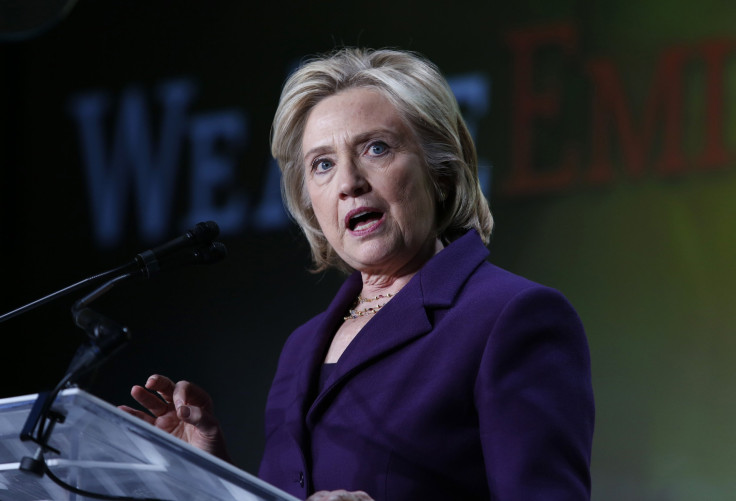Hillary Clinton Email Scandal: Colin Powell, Jeb Bush Used Private Email Also, But This Is Why Her Case Is Different

In her initial response to this week's revelation that she exclusively used private email to conduct State Department business, Hillary Clinton tried to downplay the significance of the New York Times report by saying that her predecessors as secretary of state employed the same practice. While that may be true, there are reasons why Clinton’s use of personal email is a bigger deal -- not only because she is likely running for president but also because she owned the private server connected to the account and faces allegations that she didn’t comply with federal recordkeeping requirements, put in place in 2009.
“It’s different because she’s the likely Democratic presidential nominee, so there’s never been another secretary of state in that highly charged and politicized position,” said Matt Dallek, an assistant professor of political management at the Graduate School of Political Management at George Washington University in Washington, D.C. There is also a “long history of sort of pseudo-scandals that have surrounded the Clintons and this impression, whether right or wrong, that they are highly secretive,” he said.
Republicans, claiming that Clinton solely used personal email so she could hide her messages from government scrutiny, called Thursday for a State Department investigation and urged that the emails be made public. Clinton denied the charge, and tweeted Wednesday that she wanted the public to see all of her emails. The State Department said going through the emails -- reported by the Times to be some 55,000 pages -- would take months.
“Like secretaries of state before her, she used her own email account when engaging with any Department officials. For government business, she emailed them on their Department accounts, with every expectation they would be retained. When the Department asked former secretaries last year for help ensuring their emails were in fact retained, we immediately said yes,” Clinton spokesman Nick Merrill said on Tuesday, when the Times report was published.
Colin Powell, one of the former secretaries of state Merrill was referring to, used personal email when he served in that role from 2001 to 2005. “He was not aware of any restrictions nor does he recall being made aware of any over the four years he served at State,” an aide to Powell said in a statement to Politico. “He sent emails to his staff generally via their State Department email addresses. These emails should be on the State Department computers. He might have occasionally used personal email addresses, as he did when emailing to family and friends.”
Powell, however, was secretary of state before regulations were issued in 2009 by the National Archives and Records Administration stating that government agencies and employees who used personal email had to ensure that their private messages were preserved “in the appropriate agency recordkeeping system,” the Wall Street Journal reported.
Those guidelines were issued under Clinton’s tenure, which ran from 2009 to 2013, and reports have surfaced that Clinton didn’t follow those regulations. Clinton first turned over her emails in December, only after the State Department requested them in October, or about six years after she became secretary of state, according to ABC News and the Times. While the emails were sent to the agency, critics are calling for the messages to be made public.
Clinton’s direct predecessor, Condoleezza Rice, said she never used personal email, and rarely used her State Department email address for job-related correspondence. "Secretary Rice rarely used email during her tenure at State. On the very rare occasion she did, her State Department email was the vehicle for official communication," a source close to Rice told Business Insider.
Clinton’s use of personal email has stirred controversy in part because she is a likely candidate for president in 2016, but also because she owned the private server used for her HDR22@clintonemail.com account, which means there would be no way to independently verify whether Clinton turned over all her emails.
After a hacker gained access to former Alaska Gov. and 2008 GOP vice presidential nominee Sarah Palin's private email account, it was revealed that Palin used her Yahoo address to conduct state business. Despite that, Palin called Clinton's use of private email under the same circumstances "shady and corrupt" in a tweet on Thursday:
This Clinton email scandal can't be shrugged off. If this doesn't strike you as shady and corrupt, I don't know... http://t.co/F6LAJD7xGo
— Sarah Palin (@SarahPalinUSA) March 5, 2015Jeb Bush, the former Florida governor who is considering a run for president as a Republican, used personal email while in office and owned the email server, and said he would release emails through this website “in the spirit of transparency.” But as a governor, Bush’s emails didn’t pose as much of a threat to be compromised as Clinton’s, who was the nation’s top diplomat for five years and whose emails contained classified and sensitive information. Also, President Barack Obama pledged that his administration would be the most transparent in history, and Clinton’s use of private emails goes against that goal.
Private email is also used by Washington Gov. Jay Inslee, a Democrat, but the “vast majority” of his emails are through his official government account, a spokesman told International Business Times. “The governor on occasion has sent official email to staff from his personal account, which is on one of the popular Web-based email services. Many have been photos he took with his personal phone that he wanted to share and notes of thanks. Official email sent from his personal email are subject to the same public records law in our state as if it was from his official account,” said the spokesman, David Postman.
Kathy Green, a spokeswoman for Democratic Colorado Gov. John Hickenlooper, said he uses only his government email for state business. About 10 governors’ offices didn’t return requests for comment.
© Copyright IBTimes 2024. All rights reserved.












